Unit 8 Birthdays 重难点精讲精练 (含答案)
文档属性
| 名称 | Unit 8 Birthdays 重难点精讲精练 (含答案) |
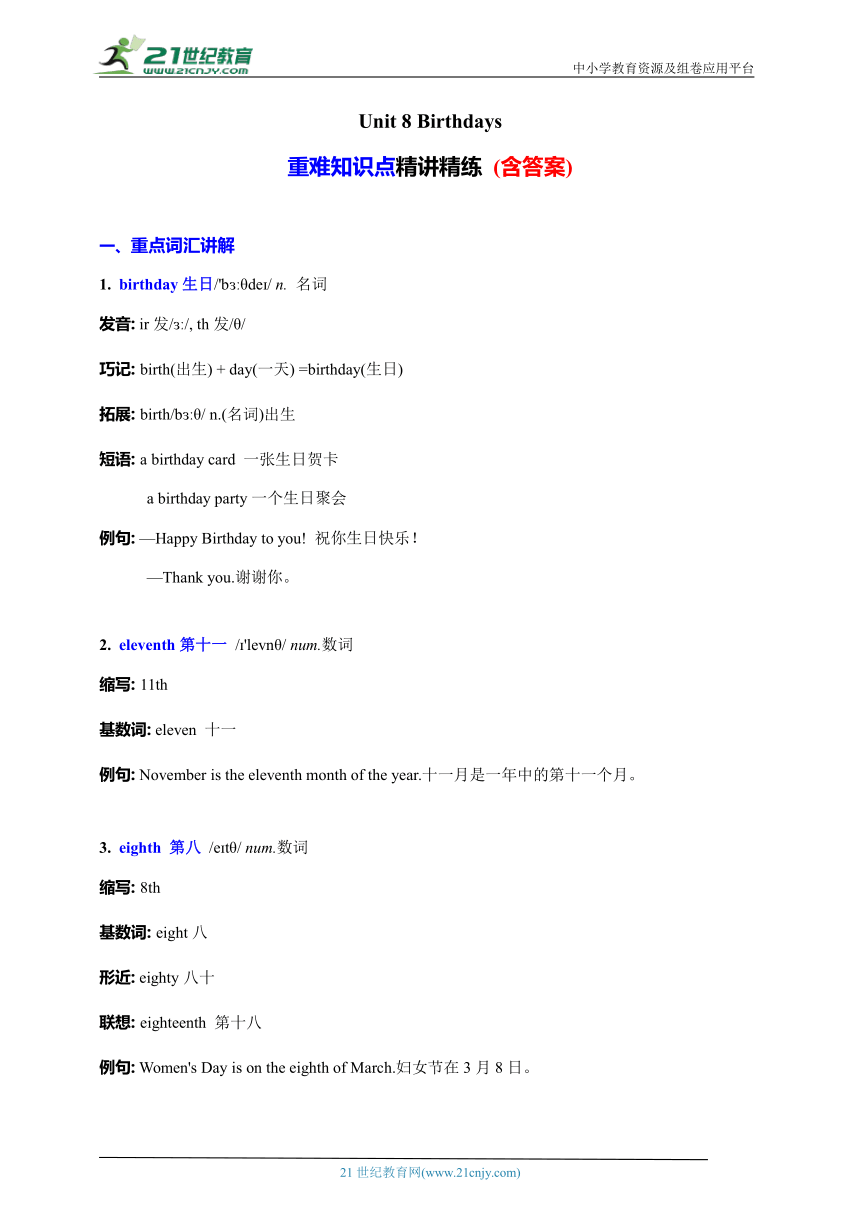
|
|
| 格式 | docx | ||
| 文件大小 | 307.3KB | ||
| 资源类型 | 试卷 | ||
| 版本资源 | 牛津译林版 | ||
| 科目 | 英语 | ||
| 更新时间 | 2024-05-16 20:24:16 | ||
图片预览

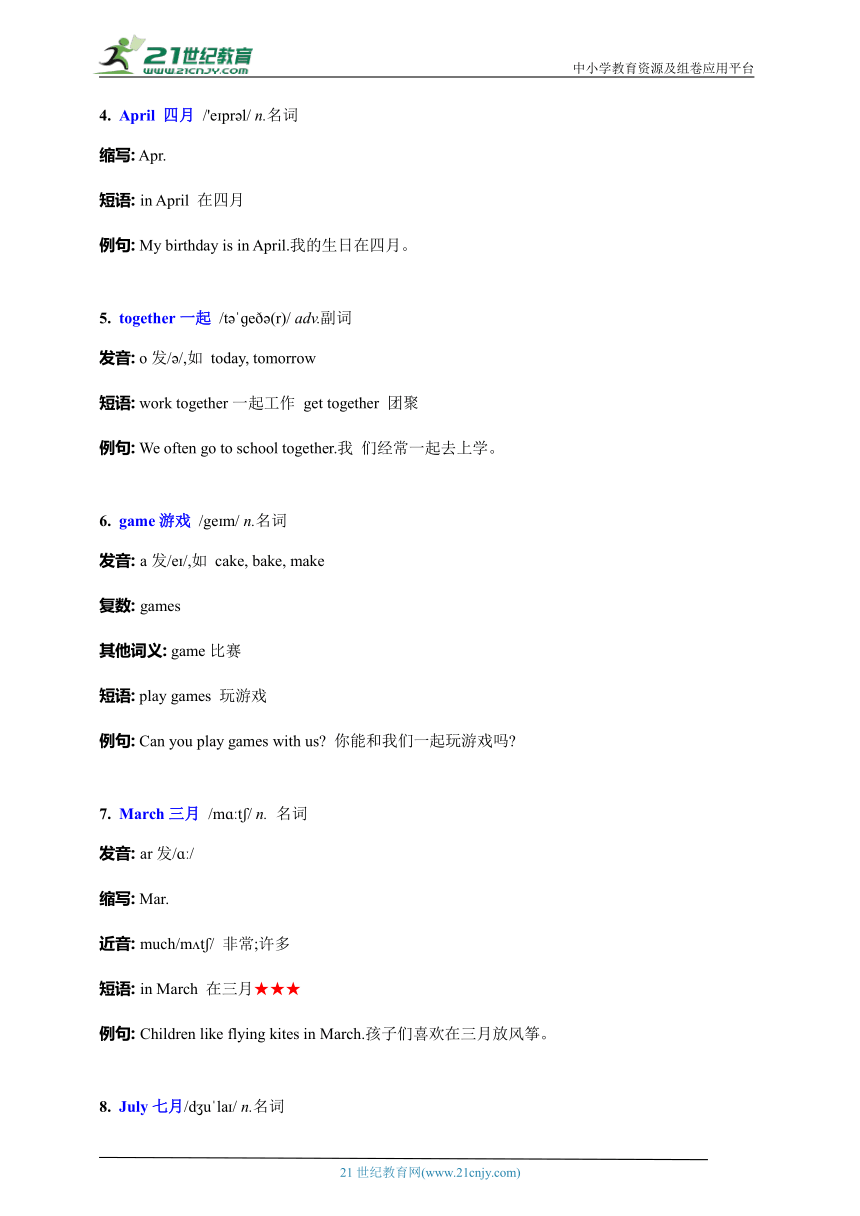
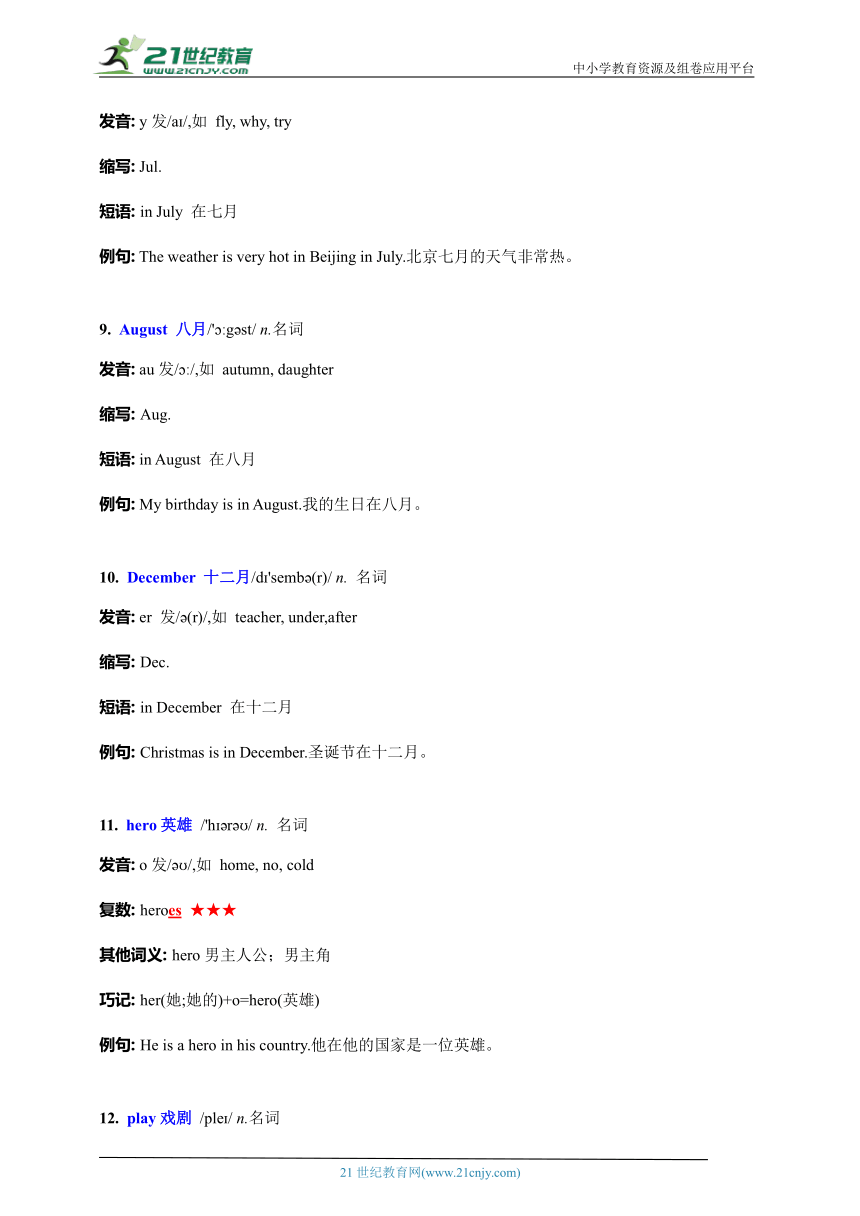
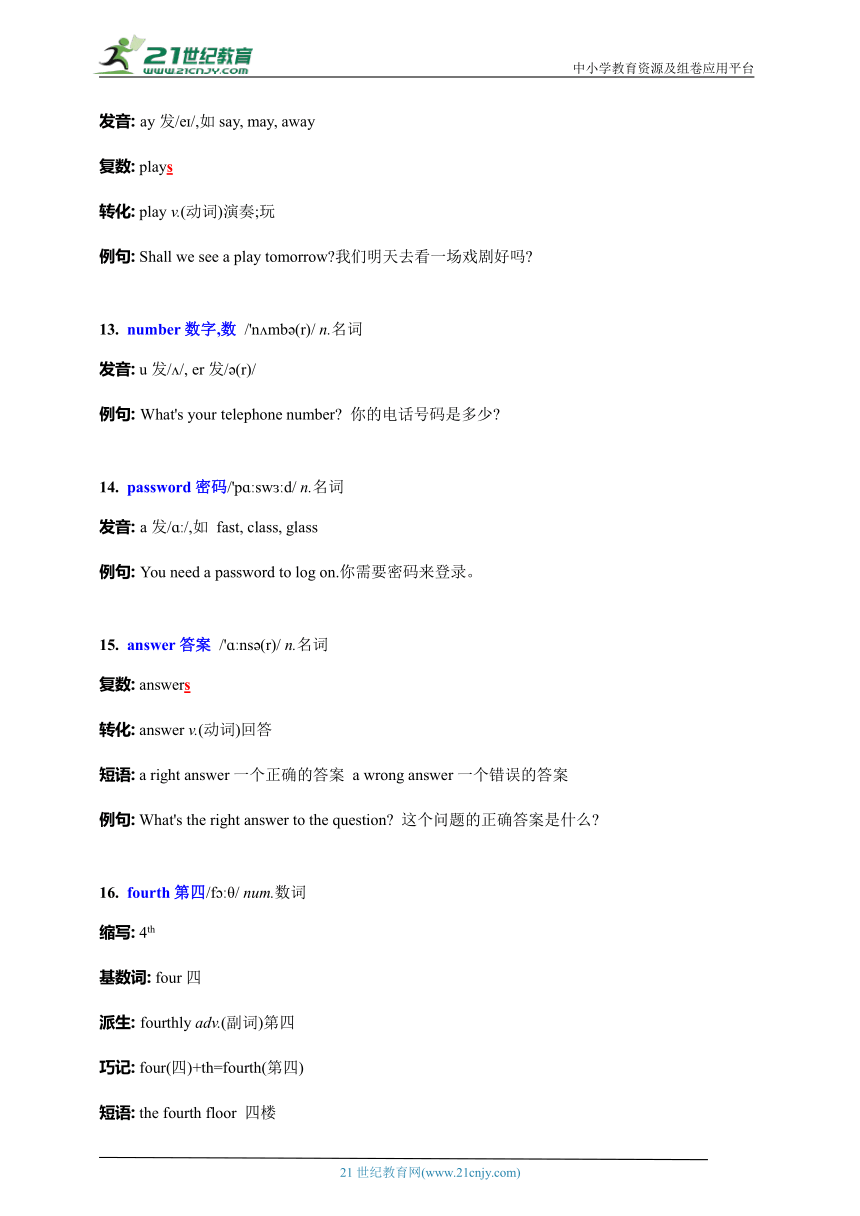
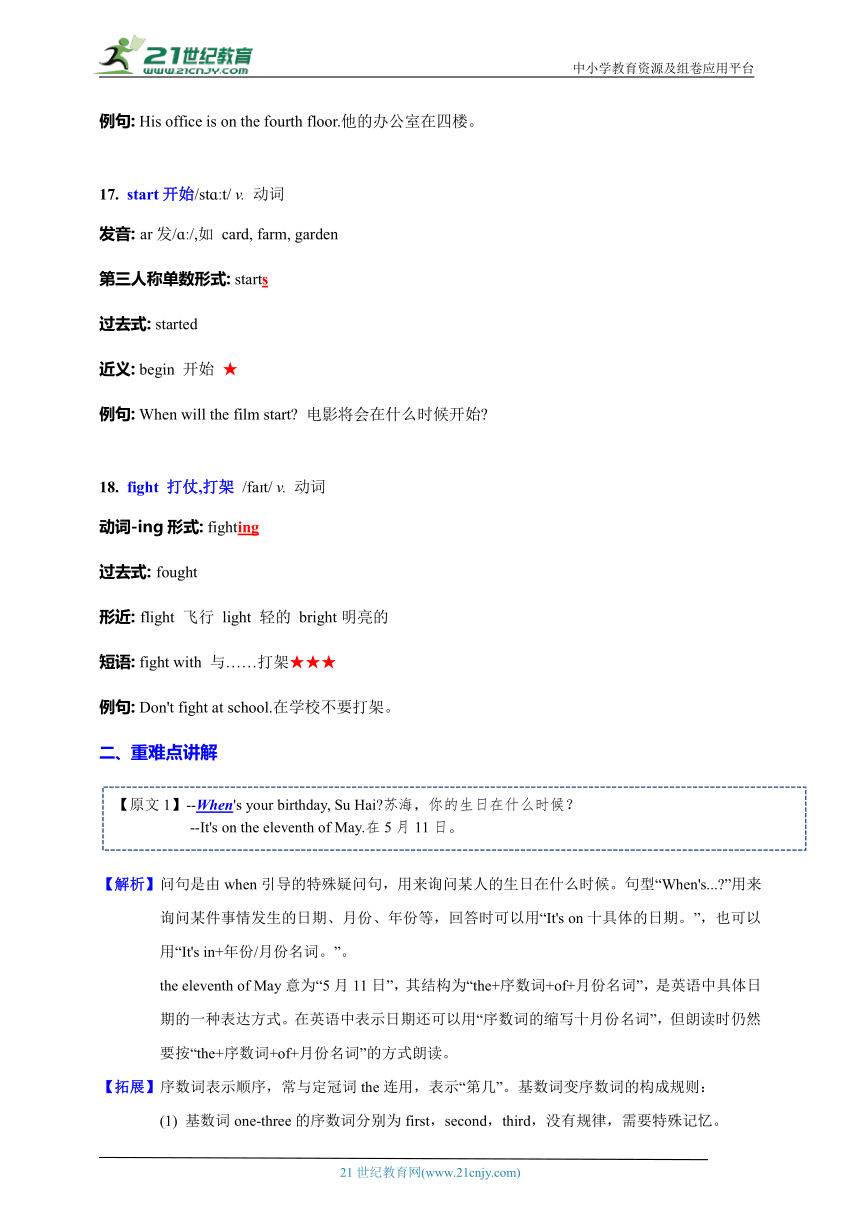
文档简介
中小学教育资源及组卷应用平台
Unit 8 Birthdays
重难知识点精讲精练 (含答案)
重点词汇讲解
birthday生日/'b θde / n. 名词
发音: ir发/ /, th发/θ/
巧记: birth(出生) + day(一天) =birthday(生日)
拓展: birth/b θ/ n.(名词)出生
短语: a birthday card 一张生日贺卡
a birthday party一个生日聚会
例句: —Happy Birthday to you! 祝你生日快乐!
—Thank you.谢谢你。
eleventh第十一 / 'levnθ/ num.数词
缩写: 11th
基数词: eleven 十一
例句: November is the eleventh month of the year.十一月是一年中的第十一个月。
eighth 第八 /e tθ/ num.数词
缩写: 8th
基数词: eight八
形近: eighty八十
联想: eighteenth 第十八
例句: Women's Day is on the eighth of March.妇女节在3月8日。
April 四月 /'e pr l/ n.名词
缩写: Apr.
短语: in April 在四月
例句: My birthday is in April.我的生日在四月。
together一起 /t ɡe (r)/ adv.副词
发音: o发/ /,如 today, tomorrow
短语: work together一起工作 get together 团聚
例句: We often go to school together.我 们经常一起去上学。
game游戏 /ge m/ n.名词
发音: a发/e /,如 cake, bake, make
复数: games
其他词义: game比赛
短语: play games 玩游戏
例句: Can you play games with us 你能和我们一起玩游戏吗
March三月 /mɑ t / n. 名词
发音: ar发/ɑ /
缩写: Mar.
近音: much/m t / 非常;许多
短语: in March 在三月★★★
例句: Children like flying kites in March.孩子们喜欢在三月放风筝。
July七月/d u la / n.名词
发音: y发/a /,如 fly, why, try
缩写: Jul.
短语: in July 在七月
例句: The weather is very hot in Beijing in July.北京七月的天气非常热。
August 八月/' g st/ n.名词
发音: au发/ /,如 autumn, daughter
缩写: Aug.
短语: in August 在八月
例句: My birthday is in August.我的生日在八月。
December 十二月/d 'semb (r)/ n. 名词
发音: er 发/ (r)/,如 teacher, under,after
缩写: Dec.
短语: in December 在十二月
例句: Christmas is in December.圣诞节在十二月。
hero英雄 /'h r / n. 名词
发音: o发/ /,如 home, no, cold
复数: heroes ★★★
其他词义: hero男主人公;男主角
巧记: her(她;她的)+o=hero(英雄)
例句: He is a hero in his country.他在他的国家是一位英雄。
play戏剧 /ple / n.名词
发音: ay发/e /,如say, may, away
复数: plays
转化: play v.(动词)演奏;玩
例句: Shall we see a play tomorrow 我们明天去看一场戏剧好吗
number数字,数 /'n mb (r)/ n.名词
发音: u发/ /, er发/ (r)/
例句: What's your telephone number 你的电话号码是多少
password密码/'pɑ sw d/ n.名词
发音: a发/ɑ /,如 fast, class, glass
例句: You need a password to log on.你需要密码来登录。
answer答案 /'ɑ ns (r)/ n.名词
复数: answers
转化: answer v.(动词)回答
短语: a right answer一个正确的答案 a wrong answer一个错误的答案
例句: What's the right answer to the question 这个问题的正确答案是什么
fourth第四/f θ/ num.数词
缩写: 4th
基数词: four四
派生: fourthly adv.(副词)第四
巧记: four(四)+th=fourth(第四)
短语: the fourth floor 四楼
例句: His office is on the fourth floor.他的办公室在四楼。
start开始/stɑ t/ v. 动词
发音: ar发/ɑ /,如 card, farm, garden
第三人称单数形式: starts
过去式: started
近义: begin 开始 ★
例句: When will the film start 电影将会在什么时候开始
fight 打仗,打架 /fa t/ v. 动词
动词-ing形式: fighting
过去式: fought
形近: flight 飞行 light 轻的 bright明亮的
短语: fight with 与……打架★★★
例句: Don't fight at school.在学校不要打架。
重难点讲解
【解析】问句是由when引导的特殊疑问句,用来询问某人的生日在什么时候。句型“When's... ”用来询问某件事情发生的日期、月份、年份等,回答时可以用“It's on十具体的日期。”,也可以用“It's in+年份/月份名词。”。
the eleventh of May意为“5月11日”,其结构为“the+序数词+of+月份名词”,是英语中具体日期的一种表达方式。在英语中表示日期还可以用“序数词的缩写十月份名词”,但朗读时仍然要按“the+序数词+of+月份名词”的方式朗读。
【拓展】序数词表示顺序,常与定冠词the连用,表示“第几”。基数词变序数词的构成规则:
基数词one-three的序数词分别为first,second,third,没有规律,需要特殊记忆。
基数词four-nineteen变序数词大多数是直接在基数词词尾加th,其中特殊的有:five--fifth,
eight--eighth, nine--ninth, twelve--twelfth。
除ten外的整十的基数词变序数词,需先将基数词词尾的y变成ie,再加th,例如:
twenty--twentieth, thirty--thirtieth, forty--fortieth。
(4)非整十的两位数基数词变序数词,十位数上的基数词形式不变,只需将个位数上的基数词变成其对应的序数词即可,例如:twenty-three变twenty-third, sixty-four变sixty-fourth.
【例句】--When's his brother's birthday 他弟弟的生日在什么时候?
--It is on the12th of December.在l2月12日。
【练习】按要求完成句子。
My father's birthday is on the sixteenth of April.(对画线部分提问)
father's birthday
【答案】When is your
【解析】此句中的after that译为“在那之后”,相当于连接副词then。
play with.意为“和一起玩”,后接某人或某物。当play with后接某物时,还有“玩…”的意思。
【拓展】play还可以用作名词,意为“戏,戏剧”。
【例句】(1)After that, I'd like to buy some fruit.在那之后,我想买一些水果。
(2)The children are playing with a ball in the park.孩子们正在公园里玩球。
(3)My grandpa often watches a play in the evening.
我的祖父经常在晚上看戏。
【练习】根据中文提示完成句子。
王兵喜欢放学后和他的朋友们一起玩。
Wang Bing likes after school.
【答案】playing with his friends
【解析】always为频度副词,意为“总是,一直”,常用于一般现在时的句子中,置于实义动词之前,be动词、助动词或情态动词之后。
【拓展】除了always,常见的频度副词还有usually,often,sometimes,seldom(不常;很少;难得),never,它们按动作的频率从高到低排序为always>usually>often>sometimes>seldom>never.
【例句】(1)Mark has a bad habit.He is always late for school.
马克有一个坏习惯。他上学总是迟到。
(2)Yang Ling usually has a piano lesson on Friday evening.
杨玲通常在星期五晚上有一节钢琴课。
(3)Old John doesn't often have a haircut.老约翰不经常理发。
【练习】根据中文提示完成句子。
山姆有时在就寝前喝一杯热牛奶
Sam a glass of hot milk before bedtime.
【答案】sometimes has//drinks
【解析】此句用来询问某人怎样才能做某事,句型结构为“How+can+主语+动词原形(+其他)?”。其中,can为情态动词,后接动词原形。
【例句】--How can I get out 我怎样才能出去?
--You can get out from another exit.你可以从另一个出口出去。
【练习】按要求完成句子。
You can ride a shared(共享的) bike to get to the metro station.(对画线部分提问)
to the metro station
【答案】How can I get
【解析】be easy for sb为固定搭配,意为“对某人来说容易”,类似的短语还有be bad for sb/sth(对某人/某物有害),be good for sb/sth(对某人/某物有益)。
be good at意为“擅长于”,后可接名词、代词的宾格形式或动名词,相当于do well in。
【例句】(1)Singing the English song well is easy for her.唱好这首英文歌曲对她来说容易。
(2)Reading in bed is bad for our eyes.在床上阅读对我们的眼睛有害。
(3)My mother is good at cooking.我的妈妈擅长烹饪。
【练习】(1) 按要求完成句子。
Monkeys are good at climbing trees.(改为同义句)
Monkeys climbing trees.
(2)根据中文提示完成句子。
水果和蔬菜对我们的健康有益。
and our health.
【答案】(1)do well in
(2)Fruit,vegetables are good for
【解析】start doing sth意为“开始做某事”。
【拓展】start后还可以接动词不定式,即start to do sth,也译为“开始做某事”,它和start doing sth的区别在于,start to do sth指即将要准备开始去做某事,事情还没有做;start doing sth指事情已经开始做了,动作呈现的状态是进行时。
【例句】(1)I start surfing the Internet to learn about the country,
我开始上网了解有关这个国家的一些知识。
(2)Before you start to work,let me show you around our office.
在你开始工作前,让我带你参观一下我们的办公室。
【练习】根据中文提示完成句子。
双胞胎开始做他们的家庭作业。
The twins their homework.
【答案】start doing
第二部分:易错易混全解
易混淆基数词和序数词的用法
【例题】用所给词的适当形式填空。
There are children in my family. I'm child.(three)
【答案】three, the third
点拨:
基数词(除one外)后接可数名词复数,序数词一般后接可数名词单数,且其前要加定冠词the,表示“第几”。本题第一个设空处后为可数名词复数children,故第一个设空处填基数词three,表示“三个孩子”;第二个设空处后为单数名词child,故第二个设空处填the third,表示“第三个孩子”。
易混淆also与too的用法
【例题】选词填空。
(1)There are (also/too)some forests in the mountains.
(2)At last,Cinderella tries on the shoe (also/too).
【答案】(1)also (2)too
点拨:
also和too都可以译为“也”,两者的区别在于,also一般用于句中,常放在be动词、助动词或情态动词之后,实义动词之前,而too一般用于句末。题(1),设空处位于句中,且在be动词are之后,故填also。题(2),设空处位于句末,故填too。
易混淆句型“When's... ”与“What time is... ”的用法
【例题】单项选择。
( )-- is your brother's birthday
--It's in September
A.What time B.When C.What day
【答案】B
点拨:
这两个句型都可以用来询问时间,但what time侧重于询问具体的时间,而when既可以询问笼统的时间,也可以询问具体的时间。根据答句可知,问句询问的并不是一个具体的时间,所以不能用what time进行提问,因此先排除选项A。而what day用来询问星期,不符合语境,因此选项C也要排除。故选B。
21世纪教育网 www.21cnjy.com 精品试卷·第 2 页 (共 2 页)
21世纪教育网(www.21cnjy.com)
Unit 8 Birthdays
重难知识点精讲精练 (含答案)
重点词汇讲解
birthday生日/'b θde / n. 名词
发音: ir发/ /, th发/θ/
巧记: birth(出生) + day(一天) =birthday(生日)
拓展: birth/b θ/ n.(名词)出生
短语: a birthday card 一张生日贺卡
a birthday party一个生日聚会
例句: —Happy Birthday to you! 祝你生日快乐!
—Thank you.谢谢你。
eleventh第十一 / 'levnθ/ num.数词
缩写: 11th
基数词: eleven 十一
例句: November is the eleventh month of the year.十一月是一年中的第十一个月。
eighth 第八 /e tθ/ num.数词
缩写: 8th
基数词: eight八
形近: eighty八十
联想: eighteenth 第十八
例句: Women's Day is on the eighth of March.妇女节在3月8日。
April 四月 /'e pr l/ n.名词
缩写: Apr.
短语: in April 在四月
例句: My birthday is in April.我的生日在四月。
together一起 /t ɡe (r)/ adv.副词
发音: o发/ /,如 today, tomorrow
短语: work together一起工作 get together 团聚
例句: We often go to school together.我 们经常一起去上学。
game游戏 /ge m/ n.名词
发音: a发/e /,如 cake, bake, make
复数: games
其他词义: game比赛
短语: play games 玩游戏
例句: Can you play games with us 你能和我们一起玩游戏吗
March三月 /mɑ t / n. 名词
发音: ar发/ɑ /
缩写: Mar.
近音: much/m t / 非常;许多
短语: in March 在三月★★★
例句: Children like flying kites in March.孩子们喜欢在三月放风筝。
July七月/d u la / n.名词
发音: y发/a /,如 fly, why, try
缩写: Jul.
短语: in July 在七月
例句: The weather is very hot in Beijing in July.北京七月的天气非常热。
August 八月/' g st/ n.名词
发音: au发/ /,如 autumn, daughter
缩写: Aug.
短语: in August 在八月
例句: My birthday is in August.我的生日在八月。
December 十二月/d 'semb (r)/ n. 名词
发音: er 发/ (r)/,如 teacher, under,after
缩写: Dec.
短语: in December 在十二月
例句: Christmas is in December.圣诞节在十二月。
hero英雄 /'h r / n. 名词
发音: o发/ /,如 home, no, cold
复数: heroes ★★★
其他词义: hero男主人公;男主角
巧记: her(她;她的)+o=hero(英雄)
例句: He is a hero in his country.他在他的国家是一位英雄。
play戏剧 /ple / n.名词
发音: ay发/e /,如say, may, away
复数: plays
转化: play v.(动词)演奏;玩
例句: Shall we see a play tomorrow 我们明天去看一场戏剧好吗
number数字,数 /'n mb (r)/ n.名词
发音: u发/ /, er发/ (r)/
例句: What's your telephone number 你的电话号码是多少
password密码/'pɑ sw d/ n.名词
发音: a发/ɑ /,如 fast, class, glass
例句: You need a password to log on.你需要密码来登录。
answer答案 /'ɑ ns (r)/ n.名词
复数: answers
转化: answer v.(动词)回答
短语: a right answer一个正确的答案 a wrong answer一个错误的答案
例句: What's the right answer to the question 这个问题的正确答案是什么
fourth第四/f θ/ num.数词
缩写: 4th
基数词: four四
派生: fourthly adv.(副词)第四
巧记: four(四)+th=fourth(第四)
短语: the fourth floor 四楼
例句: His office is on the fourth floor.他的办公室在四楼。
start开始/stɑ t/ v. 动词
发音: ar发/ɑ /,如 card, farm, garden
第三人称单数形式: starts
过去式: started
近义: begin 开始 ★
例句: When will the film start 电影将会在什么时候开始
fight 打仗,打架 /fa t/ v. 动词
动词-ing形式: fighting
过去式: fought
形近: flight 飞行 light 轻的 bright明亮的
短语: fight with 与……打架★★★
例句: Don't fight at school.在学校不要打架。
重难点讲解
【解析】问句是由when引导的特殊疑问句,用来询问某人的生日在什么时候。句型“When's... ”用来询问某件事情发生的日期、月份、年份等,回答时可以用“It's on十具体的日期。”,也可以用“It's in+年份/月份名词。”。
the eleventh of May意为“5月11日”,其结构为“the+序数词+of+月份名词”,是英语中具体日期的一种表达方式。在英语中表示日期还可以用“序数词的缩写十月份名词”,但朗读时仍然要按“the+序数词+of+月份名词”的方式朗读。
【拓展】序数词表示顺序,常与定冠词the连用,表示“第几”。基数词变序数词的构成规则:
基数词one-three的序数词分别为first,second,third,没有规律,需要特殊记忆。
基数词four-nineteen变序数词大多数是直接在基数词词尾加th,其中特殊的有:five--fifth,
eight--eighth, nine--ninth, twelve--twelfth。
除ten外的整十的基数词变序数词,需先将基数词词尾的y变成ie,再加th,例如:
twenty--twentieth, thirty--thirtieth, forty--fortieth。
(4)非整十的两位数基数词变序数词,十位数上的基数词形式不变,只需将个位数上的基数词变成其对应的序数词即可,例如:twenty-three变twenty-third, sixty-four变sixty-fourth.
【例句】--When's his brother's birthday 他弟弟的生日在什么时候?
--It is on the12th of December.在l2月12日。
【练习】按要求完成句子。
My father's birthday is on the sixteenth of April.(对画线部分提问)
father's birthday
【答案】When is your
【解析】此句中的after that译为“在那之后”,相当于连接副词then。
play with.意为“和一起玩”,后接某人或某物。当play with后接某物时,还有“玩…”的意思。
【拓展】play还可以用作名词,意为“戏,戏剧”。
【例句】(1)After that, I'd like to buy some fruit.在那之后,我想买一些水果。
(2)The children are playing with a ball in the park.孩子们正在公园里玩球。
(3)My grandpa often watches a play in the evening.
我的祖父经常在晚上看戏。
【练习】根据中文提示完成句子。
王兵喜欢放学后和他的朋友们一起玩。
Wang Bing likes after school.
【答案】playing with his friends
【解析】always为频度副词,意为“总是,一直”,常用于一般现在时的句子中,置于实义动词之前,be动词、助动词或情态动词之后。
【拓展】除了always,常见的频度副词还有usually,often,sometimes,seldom(不常;很少;难得),never,它们按动作的频率从高到低排序为always>usually>often>sometimes>seldom>never.
【例句】(1)Mark has a bad habit.He is always late for school.
马克有一个坏习惯。他上学总是迟到。
(2)Yang Ling usually has a piano lesson on Friday evening.
杨玲通常在星期五晚上有一节钢琴课。
(3)Old John doesn't often have a haircut.老约翰不经常理发。
【练习】根据中文提示完成句子。
山姆有时在就寝前喝一杯热牛奶
Sam a glass of hot milk before bedtime.
【答案】sometimes has//drinks
【解析】此句用来询问某人怎样才能做某事,句型结构为“How+can+主语+动词原形(+其他)?”。其中,can为情态动词,后接动词原形。
【例句】--How can I get out 我怎样才能出去?
--You can get out from another exit.你可以从另一个出口出去。
【练习】按要求完成句子。
You can ride a shared(共享的) bike to get to the metro station.(对画线部分提问)
to the metro station
【答案】How can I get
【解析】be easy for sb为固定搭配,意为“对某人来说容易”,类似的短语还有be bad for sb/sth(对某人/某物有害),be good for sb/sth(对某人/某物有益)。
be good at意为“擅长于”,后可接名词、代词的宾格形式或动名词,相当于do well in。
【例句】(1)Singing the English song well is easy for her.唱好这首英文歌曲对她来说容易。
(2)Reading in bed is bad for our eyes.在床上阅读对我们的眼睛有害。
(3)My mother is good at cooking.我的妈妈擅长烹饪。
【练习】(1) 按要求完成句子。
Monkeys are good at climbing trees.(改为同义句)
Monkeys climbing trees.
(2)根据中文提示完成句子。
水果和蔬菜对我们的健康有益。
and our health.
【答案】(1)do well in
(2)Fruit,vegetables are good for
【解析】start doing sth意为“开始做某事”。
【拓展】start后还可以接动词不定式,即start to do sth,也译为“开始做某事”,它和start doing sth的区别在于,start to do sth指即将要准备开始去做某事,事情还没有做;start doing sth指事情已经开始做了,动作呈现的状态是进行时。
【例句】(1)I start surfing the Internet to learn about the country,
我开始上网了解有关这个国家的一些知识。
(2)Before you start to work,let me show you around our office.
在你开始工作前,让我带你参观一下我们的办公室。
【练习】根据中文提示完成句子。
双胞胎开始做他们的家庭作业。
The twins their homework.
【答案】start doing
第二部分:易错易混全解
易混淆基数词和序数词的用法
【例题】用所给词的适当形式填空。
There are children in my family. I'm child.(three)
【答案】three, the third
点拨:
基数词(除one外)后接可数名词复数,序数词一般后接可数名词单数,且其前要加定冠词the,表示“第几”。本题第一个设空处后为可数名词复数children,故第一个设空处填基数词three,表示“三个孩子”;第二个设空处后为单数名词child,故第二个设空处填the third,表示“第三个孩子”。
易混淆also与too的用法
【例题】选词填空。
(1)There are (also/too)some forests in the mountains.
(2)At last,Cinderella tries on the shoe (also/too).
【答案】(1)also (2)too
点拨:
also和too都可以译为“也”,两者的区别在于,also一般用于句中,常放在be动词、助动词或情态动词之后,实义动词之前,而too一般用于句末。题(1),设空处位于句中,且在be动词are之后,故填also。题(2),设空处位于句末,故填too。
易混淆句型“When's... ”与“What time is... ”的用法
【例题】单项选择。
( )-- is your brother's birthday
--It's in September
A.What time B.When C.What day
【答案】B
点拨:
这两个句型都可以用来询问时间,但what time侧重于询问具体的时间,而when既可以询问笼统的时间,也可以询问具体的时间。根据答句可知,问句询问的并不是一个具体的时间,所以不能用what time进行提问,因此先排除选项A。而what day用来询问星期,不符合语境,因此选项C也要排除。故选B。
21世纪教育网 www.21cnjy.com 精品试卷·第 2 页 (共 2 页)
21世纪教育网(www.21cnjy.com)
